calsfoundation@cals.org
"Footsie" Britt (1919–1995)
aka: Maurice Lee Britt
aka: Morris Britt
Maurice Lee “Footsie” Britt was an Arkansas native who rose to fame as an athlete, soldier, businessman, and state politician. He played football and basketball at the University of Arkansas (UA) in Fayetteville (Washington County) and then advanced to professional football, until the attack on Pearl Harbor propelled the country into World War II. Britt became an exemplary soldier as the first person in American history to earn all the army’s top awards, including the Medal of Honor, while fighting in a single war. After suffering numerous wounds, including one that caused his right arm to have to be amputated, Britt returned to Arkansas and undertook a career in business management. Later in life, he served two terms as the lieutenant governor of Arkansas. Britt was also a cousin to internationally known actress Dorothy Lamour.
Morris Britt was born on June 29, 1919, in Carlisle (Lonoke County), the son of Morris Lee and Virgie Britt, who farmed in the area. He was named Morris after his father, but during grade school, a teacher told him his name was spelled wrong and changed the spelling to Maurice.
The family moved to Lonoke (Lonoke County) when Britt was a boy, where he completed high school. There are various explanations as to how Britt received his nickname, “Footsie,” but most credit the moniker to his size-thirteen shoes. Since everyone called him by his nickname, he did not know of any misspelling of his name until decades later, when he obtained a copy of his birth certificate.
While attending school in Lonoke, Britt’s physical prowess was evident in every sport he played. He was also an excellent student; he won several essay contests and was lauded for his achievements in Latin and English. While a senior at Lonoke High School, he was elected class president and also served as captain of the track, football, and basketball teams. Britt was the valedictorian when he graduated on June 5, 1937.
An athletic scholarship at UA led Britt to earn letters in basketball and football. He was a member of the Sigma Chi fraternity and sports editor of the student newspaper, Arkansas Traveler. Britt married Nancy Mitchell of Fort Smith (Sebastian County) on June 8, 1941, and graduated with a degree in journalism the next day.
Britt played professional football for the Detroit Lions until his career was shortened due to his draft into the army in December 1941. As an officer with the Third Infantry Division, his athletic abilities and experience with teamwork served him well while he commanded action in the African, Sicilian, and Italian campaigns.
In a battle to take Rome on November 10, 1943, near Mignano, Italy, Britt led his small company of men in a counterattack opposing approximately 100 German soldiers. Without the repulse of this attack, his battalion would have been isolated and his company destroyed. It was an intense firefight and involved hand grenades and close-range machine gun, pistol, and rifle fire. During this fierce battle, Britt received a bullet wound in his side while his chest, face, and hands were covered with wounds caused by grenades, yet he still managed to throw thirty-two hand grenades. His bold and aggressive actions against the Germans were successful and allowed several captured Americans to escape.
Involved in many battles, Britt later lost his right arm when a grenade landed near him on February 12, 1944. For his military gallantry and intrepidity above and beyond the call of duty in the Mignano, Italy, battle, he received the Medal of Honor. Other awards for his service included the Distinguished Service Cross, the Silver Star, the Bronze Star, and the Purple Heart from the United States, as well as the Military Cross of the British Empire and the Al Valoré Militaré Merit from the Italians. Britt received his Medal of Honor on the UA football field during the 1944 commencement ceremony.
On September 18, 1948, Britt gave the dedication speech for War Memorial Stadium in Little Rock (Pulaski County), which was named to honor those who lost their lives in World War I and World War II.
Britt settled in Fort Smith, where he joined a furniture manufacturing business owned by his wife’s family. He and Nancy had three children: Andrea, Maurice Jr., and Nancy Lea. In 1963, he relocated to Little Rock and established his own aluminum product manufacturing business.
He and Nancy eventually divorced. His second marriage was to Patricia Allbright Britt on November 12, 1966; she died on December 1, 1993.
In 1966, Britt switched allegiances from the Democratic to the Republican Party, likely in conflict with segregationist beliefs held by some in the Democratic Party at the time. He successfully ran for lieutenant governor while Winthrop Rockefeller ran for governor, and both courted newly enfranchised African American voters. Britt served two terms, ending in 1970. When he chose not to run for reelection in 1970, he became the campaign manager for Rockefeller’s unsuccessful third-term bid.
Britt was offered a position as the district director of the Small Business Administration by President Nixon in 1971 and served in this capacity until 1985. He ran for the Republican nomination for governor in 1986 but suffered defeat by former governor Frank White.
Britt died on November 26, 1995, and is buried in the Little Rock National Cemetery.
For additional information:
Dillard, Tom. “‘Footsie’ Britt excelled in sports, military, business.” Arkansas Democrat-Gazette. June 18, 2006, p. 5H.
Kershaw, Alex. Against All Odds: A True Stamp of Ultimate Courage and Survival in World War II. New York: Dutton, 2022
Maurice “Footsie” Britt Collection. Special Collections. University of Arkansas Libraries, Fayetteville, Arkansas. Finding aid online at https://uark.as.atlas-sys.com/repositories/2/resources/2296 (accessed August 29, 2023).
McGee, Emily. “Medal of Honor Recipients from Camp Robinson.” Arkansas Military History Journal 14 (Summer 2020): 4–8.
Virgie Oliver Britt Collection. University of Central Arkansas Archives and Special Collections, Conway, Arkansas. Finding aid online at https://uca.edu/archives/m96-01-virgie-britt-diaries-collection/ (accessed August 29, 2023).
Ellen E. Withers
Conway, Arkansas


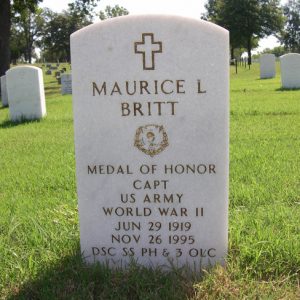
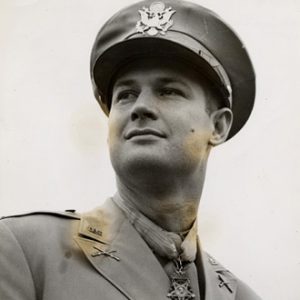
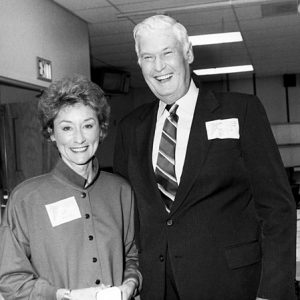
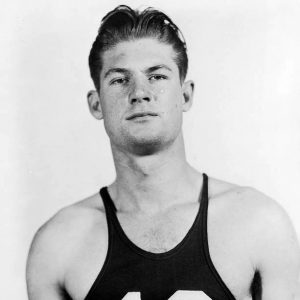
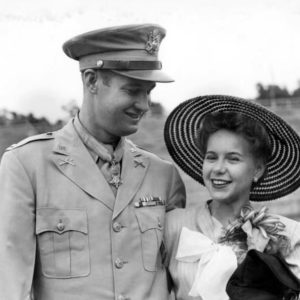
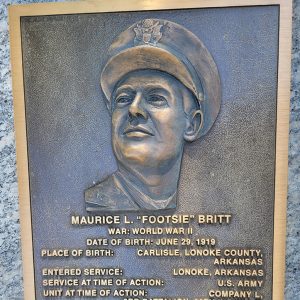
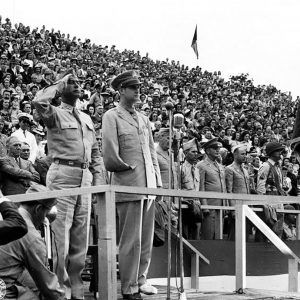
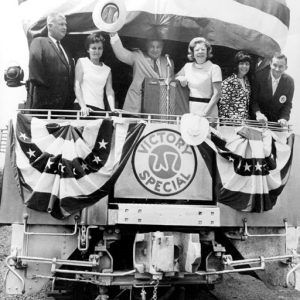





Footsie Britt remains well into the twenty-first century Arkansas’s most unsung and underappreciated war hero and leader. Other men with his credentials would have been elected to the highest offices in the land, but he settled for lieutenant governor of Arkansas twice, to help his friend and fellow Republican, Winthrop Rockefeller. In the spring of 1970, Britt persuaded his next-door neighbor House Speaker Sterling R. Cockrill Jr. to leave the Democratic Party and take his place on the ticket with Rockefeller, believing that it would propel his young friend to the highest offices, governor and U.S. senator, when Rockefeller eventually stepped down.
Britt was not only a great athlete and war hero but a scholar and an apostle of Jefferson’s, Lincoln’s and Truman’s notion that America should always be the world’s champion of human rights and should use its power to protect democratic nations from tyrants like Hitler, Stalin, and now Putin.
When Arkansas dedicated the new War Memorial Stadium at the Arkansas Razorbacks’ first game in September 1948, Britt was the speaker, introduced by Governor Ben Laney. The Arkansas Gazette’s great reporter Inez MacDuff recorded the event on the front page:
“The principal speaker was a universally loved Arkansas war hero–Maurice (‘Footsie’) Britt, who wears with quiet dignity in peace the earned honors of his outstanding war record.
‘A stadium comes to life on days like today,’ he told the hushed, waiting crowd. ‘It is easy for us, the living, to honor the sacrifices of the dead, for it helps us to assuage the guilt we should feel in their presence. Wars can be prevented just as easily as they are provoked, and we who fail to prevent them share in guilt for the dead. If ever again the United States stoops to expediency to avoid the difficult decisions of leadership and the heavy burdens of defense, if we continue from crisis to crisis with inoffensive solutions, if we alter our policies from day to day to give false impressions of security, then we must hang our heads in shame and admit that we are not worthy to stand in this sacred place in reverence to those whom we honor today. We must now accept the challenge of their deaths and resolve to employ our strength, power and conscience to defend human dignity and freedom forever.’”
“Glamour,” MacDuff continued, “is a special kind of American tradition, known to the masses in no other country. A pretty girl always will be something very special in a land where the ‘Miss America’ contest is major news annually. But yesterday was no time to hear the words or enjoy the smiles of any glamour queen. Yesterday it was far more eloquent to see ‘Footsie’ Britt’s empty right sleeve swinging uselessly at his side.”
MacDuff, Inez Hazel. “Minor Trial by Fire Undergone at Opener,” Arkansas Gazette, September 1, 1948, p. 1.